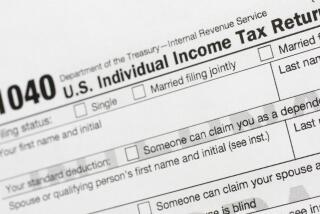Finders Keepers, Losers Weepers : Pay the IRS too little or too much, it’s all the same: you’re stuck
- Share via
In 1984, a senile 93-year-old Granada Hills man sent the Internal Revenue Service a check for $7,000, not because he owed any money but because he was confused. That same year, a befuddled alcoholic living in Hawaii mailed the IRS a check for $30,000, to cover a nonexistent tax liability. Both mistakes were subsequently discovered and reimbursement from the IRS was sought. But those requests came after the three-year limit set in the tax code for claiming refunds had passed. Appeals to the U.S. Supreme Court brought a ruling this week upholding the law. The Treasury is thus $37,000 richer, not through any honest collection of taxes due but because its collection agency chose to profit from mistakes made by people who were mentally incompetent.
The court may have been right in ruling that the time limit for claiming refunds is necessary to the orderly administration of the tax system. Left unexplained in all this is how the IRS could fail to notice that several people had sent it a lot of money they really didn’t owe, or why, having identified the mistakes, the IRS didn’t promptly act to rectify them. There’s no mystery about what the IRS would do if a taxpayer came up $7,000 short. Why, in the name of simple moral responsibility, could the IRS not be equally vigorous in refunding to taxpayers what is rightfully theirs?
A recent change in the tax laws that will waive the time limit on refunds for overpayments in cases of mental and physical disability will take effect next year. Meanwhile, the Treasury’s books show a windfall of $37,000--and who knows how much more that hasn’t been publicized--because of obvious mistakes by taxpayers. Finders keepers, losers weepers. That’s a lousy way to run a tax collecting system.
More to Read
Inside the business of entertainment
The Wide Shot brings you news, analysis and insights on everything from streaming wars to production — and what it all means for the future.
You may occasionally receive promotional content from the Los Angeles Times.










